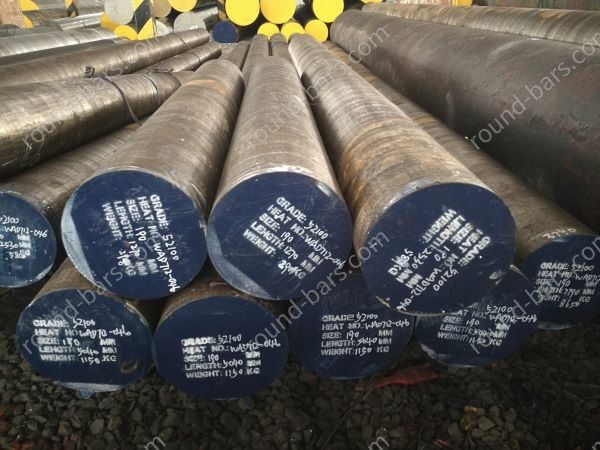AISI 52100 belongs to bearing steel as per ASTM A295.As the most widely used high carbon chromium bearing steel with less alloy content, good performance, AISI 52100 steel has good comprehensive performance, with high and uniform hardness, good wear resistance, high contact fatigue performance after quenching and tempering.
AISI 52100 steel has good hot working performance, medium cold working plasticity, good machinability after spheroidizing annealing, general cutting performance,but poor in weldability,aslo has high sensitivity to white spot, and easy to temper brittleness.

AISI 52100 BEARING STEEL SUPPLY FORM & SIZE & TOLERANCE
Hot Forged Round bar:Φ80-Φ1000mm
Hot Rolled Round bar:Φ16-Φ130mm
Hot Forged Square bar: Max Thickness:500mm
Flat bar/Blcoks:Thickness :120-800mm ,Width:120-1500mm
| Surface Finish | Black-Forged | Black-Rolled | Rough Turned | Cold Drawn | Peeled | Polished | Grinded |
| Tolerance | 0/+5mm | 0/+1mm | 0/+3mm | Best H11 | Best H9 | Best H9 | Best h8 |
WHAT IS BEARING STEEL?
Bearing steel is the steel used to make balls, rollers and bearing rings. Bearing steel has high and uniform hardness and wear resistance, as well as a high elastic limit. The requirements for the uniformity of the chemical composition of the bearing steel, the content and distribution of non-metallic inclusions, and the distribution of carbides are very strict, and it is one of the most stringent steel grades in all steel production.
Bearing Steel Basic Requirements
- Strict chemical composition requirements
- Higher dimensional accuracy requirements
- Particularly stringent purity requirements
- Strict macroscopic and microscopic structure requirements
- Particularly stringent requirements for surface defects and internal defects
- Strict carbide inhomogeneity requirements
- Strict surface decarburization layer depth requirements
Bearing Steel Performance Requirements
- High contact fatigue strength
- High hardness
- High wear resistance & Low friction coefficient
- High elastic limit
- Good impact toughness & Fracture toughness
- Good dimensional stability
- Good rust resistance
- Good cold and hot processing properties
Bearing Steel Main Classification
- Fully hardened bearing steel
Typical Grades:AISI 52100,GCr15,100Cr6,SUJ2
- Surface hardened bearing steel
Typical Grades:AISI 8620,SNCM220,SNCM420,20NiCrMo2-2,AISI 4118,AISI 4320
- Stainless bearing steel
Typical Grades:SUS440C,AISI 440C
- High temperature bearing steel
Typical Grades:M2,W18Cr4V
AISI 52100 STEEL CHEMICAL COMPOSITION
| Grade | C | Si | Mn | P | S | Cr | Ni | Mo | Cu |
| 52100 | 0.93-1.05 | 0.15-0.35 | 0.25-0.45 | ≤0.025 | ≤0.015 | 1.35-1.60 | ≤0.25 | ≤0.1 | ≤0.3 |
| 100Cr6/1.3505 | 0.90-1.05 | 0.15-0.35 | 0.25-0.45 | ≤0.03 | ≤0.025 | 1.35-1.65 | ≤0.3 | - | ≤0.3 |
| SUJ2 | 0.95-1.10 | 0.15-0.35 | ≤0.5 | ≤0.025 | ≤0.025 | 1.3-1.6 | - | - | - |
AISI 52100 STEEL RELATED STANDARD & EQUIVALENT GRADE
CHINA/GB 18254:GCr15
Germany/DIN 17230:100Cr6/1.3505
JAPAN/JIS G4805:SUJ2
UK/BS970:535A99/EN31
AISI 52100 BEARING STEEL FORGING
- Initial Forging Temperature:1050-1100℃
- Final Forging Temperature:800-850℃
- Forging Ratio:above 4:1
- Post-Forging Treatment: AISI 52100 steel is air-cooled to 700°C after forging and cooled in sand. After forging, the organization is flaky pearlite, allowing the appearance of fine network carbides.
Once the forging process of AISI 52100 steel is improper, for example, the final forging temperature is too high and the cooling rate after forging is too slow, the carbides will obviously precipitate along the austenite grain boundaries, resulting in the formation of coarse network carbides.
Another example is that the final forging temperature is too low, the carbides precipitated along the grain boundaries will be elongated along the deformation direction together with the austenite grains, so that the carbides are striped.
Both of these two types of carbides cannot be changed by the spheroidizing annealing process, and must be eliminated by the normalizing method before the spheroidizing annealing, so as to ensure the spheroidizing annealing quality and give the material good heat treatment properties.
AISI 52100 BEARING STEEL HEAT TREATMENT
AISI 52100 Steel Normalizing Process
- Heating temperature:900-950℃
- Holding time:1 to 2 hour
- Cooling:Dispersed air cooling
- Hardness:270-590HB
AISI 52100 Steel Mechanical Properties in Normalizing Conditon
| Normalizing Temperature | Tensile Strength | Impact Charpy-V | Hardness |
| 900℃ | ≥1210Mpa | ≥78J | ≥39HRC |
AISI 52100 Steel Normal Annealing Process
- Heating temperature:790-810℃
- Heating time:2 to 6 hour
- Cooling Rate:≤10-30 ℃/h
- Our-Furnace temperature:650℃
- Hardness:170-207HB
AISI 52100 Steel Isothermal Annealing Process
- Heating temperature:790-810℃
- Heating time:2 to 6 hour
- Isothermal temperature:710-720℃
- Isothermal time: 1 to 2 hour
- Hardness:207-209 HB
AISI 52100 Steel Mechanical Properties in Annealing Conditon
| Tensile Strength | Yield Strength | Elongation | Reduction of Area | Impact Charpy-V | Hardness |
| 600-730Mpa | 360-420Mpa | 15-25% | 25-59% | 45-90J | 179-207HBW |
AISI 52100 Steel Quenching & Tempering Process
- Quenching temperature:835-850℃
- Quenching medium:Oil
- Quenching hardness:≥63HRC
- Tempering temperature:150-170℃
- Cooling:Air cooling
- Tempering hardness:61-65HRC
AISI 52100 Steel Tempering Temperature Vs Hardness
| Grade | Quenching | Tempering Temperature,ºC | ||||||||
| Temperature,ºC | Hardness | 150ºC | 200ºC | 300ºC | 400ºC | 500ºC | 550ºC | 600ºC | 650ºC | |
| 52100 | 860ºC | 62-66 | 64 | 61 | 55 | 49 | 41 | 36 | 31 | 28 |
AISI 52100 Steel Mechanical Property with Quenched and Tempered Condition
AISI 52100 steel 840℃ Oil Quenching, Followed by Tempering with 150℃
- Hardness:62.9HRC
- Bending strength:2510Mpa
- Deflection:2.8mm
- Impact: 52J